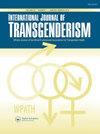The transgender parent: Experiences and constructions of pregnancy and parenthood for transgender men in Australia
Q1 Social Sciences
引用次数: 79
Abstract
ABSTRACT Background: Transgender (trans) men are commonly born with the reproductive anatomy that allows them to become pregnant and give birth and many wish to do so. However, little is known about Australian trans men's experiences of desiring parenthood and gestational pregnancy. Aims: The present study aims to address this gap in the literature through addressing the following research questions: how do Australian trans men construct and experience their desire for parenthood? And, how do Australian trans men construct and experience gestational pregnancy? Methods: This study aimed to explore these experiences, through a mixed-methods research design using online survey data and one-on-one interviews, with 25 trans men, aged 25–46 years old, who had experienced a gestational pregnancy. Data were analyzed using thematic analysis. Results: For our participants, parenthood was initially described as alienating and complex, however transitioning enabled participants to negotiate and construct their own parenting identity. Pregnancy was positioned as a problematic but “functional sacrifice,” however formal assisted fertility experiences were rife with exclusion. At the same time dysphoria associated with withdrawing from testosterone and the growing fecund body were significantly troubling. Changes to the chest were of particular concern for participants. Exclusion, isolation, and loneliness were the predominant features of trans men's experiences of gestational pregnancies. Healthcare systems are not generally supportive of trans bodies and identities and trans men encounter significant issues when interacting with healthcare providers. As such, the results reinforce the importance of inclusive and specialized health services to support trans men through pregnancy.跨性别父母:澳大利亚跨性别男性怀孕和为人父母的经验和建构
背景:跨性别(trans)男性通常天生具有生殖解剖结构,使他们能够怀孕和生育,许多人希望这样做。然而,人们对澳大利亚跨性别男性渴望为人父母和怀孕的经历知之甚少。目的:本研究旨在通过解决以下研究问题来解决这一文献空白:澳大利亚跨性别男性如何构建和体验他们的生育欲望?另外,澳大利亚的跨性别男性是如何构建和体验怀孕的?方法:本研究旨在探讨这些经历,通过混合方法的研究设计,使用在线调查数据和一对一访谈,25名年龄在25 - 46岁之间,经历过妊娠期的跨性别男性。数据采用专题分析进行分析。结果:对于我们的参与者来说,父母身份最初被描述为疏远和复杂的,然而过渡使参与者能够协商和构建自己的父母身份。怀孕被定位为一种有问题的“功能性牺牲”,然而正式的辅助生育经历却充满了排斥。与此同时,与睾酮的减少和生育能力的增强有关的烦躁不安也很令人不安。参与者特别关注胸部的变化。排斥、孤立和孤独是跨性别男性妊娠经历的主要特征。医疗保健系统通常不支持跨性别者和身份,跨性别者在与医疗保健提供者互动时会遇到重大问题。因此,研究结果强调了提供包容性和专业化的保健服务以支持跨性别男子怀孕的重要性。
本文章由计算机程序翻译,如有差异,请以英文原文为准。
求助全文
约1分钟内获得全文
求助全文
来源期刊

International Journal of Transgenderism
Social Sciences-Gender Studies
CiteScore
5.10
自引率
0.00%
发文量
0
期刊介绍:
International Journal of Transgenderism, together with its partner organization the World Professional Association for Transgender Health (WPATH), offers an international, multidisciplinary scholarly forum for publication in the field of transgender health in its broadest sense for academics, practitioners, policy makers, and the general population.
The journal welcomes contributions from a range of disciplines, such as:
Endocrinology
Surgery
Obstetrics and Gynaecology
Psychiatry
Psychology
Speech and language therapy
Sexual medicine
Sexology
Family therapy
Public health
Sociology
Counselling
Law
Medical ethics.
 求助内容:
求助内容: 应助结果提醒方式:
应助结果提醒方式:


